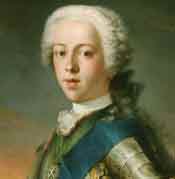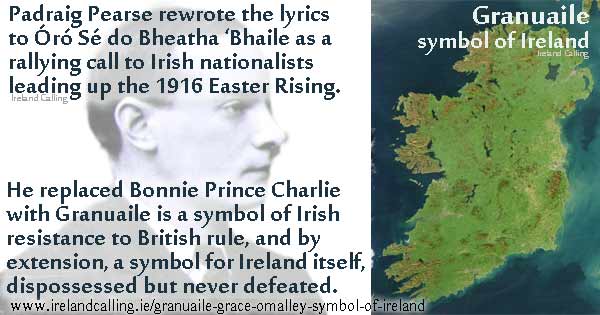Granuaile was a remarkable woman who captured the imaginations of people in Ireland and all over the world because of her extraordinary exploits as the leader of the O’Malley clan in the second half of the 16th century.
She was an enigmatic character; on the one hand intelligent and well educated, on the other a ruthless military leader who fought numerous battles with the English as they tried to subdue Ireland.
Granuaile/Grace O’Malley
Granuaile meets Queen Elizabeth
Granuaile – symbol of Ireland
Her exploits made her a heroic figure and she went down in folklore as a symbol of Irish resistance to British rule. By extension, she also became a symbol for Ireland itself, dispossessed but never defeated and never resting until freedom was regained, no matter how much self-sacrifice that entailed for her.
Pearse put Granuaile at the heart of the resistance

This was the image of Granuaile and Ireland that Padraig Pearse wanted to project when he rewrote the lyrics as a rallying call to Irish nationalists leading up to the 1916 Easter Rising in Ireland.
The traditional version, which dates back to the 18th century, originally referred to Bonnie Prince Charlie and his Jacobite Rebellion to gain the English throne.
Read the history of the song here; Óró Sé do Bheatha ‘Bhaile
Pearse’s version of the song removes Bonnie Prince Charlie and replaces him with Granuaile, a true, native Irish figurehead.
The song now welcomes Granuaile home and refers to her imprisonment, which is mirrored by the effective imprisonment of the Irish people who saw their land being usurped by the English.
Here’s Sinéad O’Connor singing Óró ‘sé do bheatha ‘bhaile. More videos here
Granuaile the concert work by Shaun Davey
Granuaile has always been a major figure in the Irish nationalist consciousness and has featured in several songs as a symbol of Ireland and its resistance to British rule.
In recent years, her name has become more widely known throughout the world thanks to the musical work, Granuaile, written by Irish composer Shaun Davey.
Numerous artists have performed extracts from Davey’s work, including Celtic Woman.
